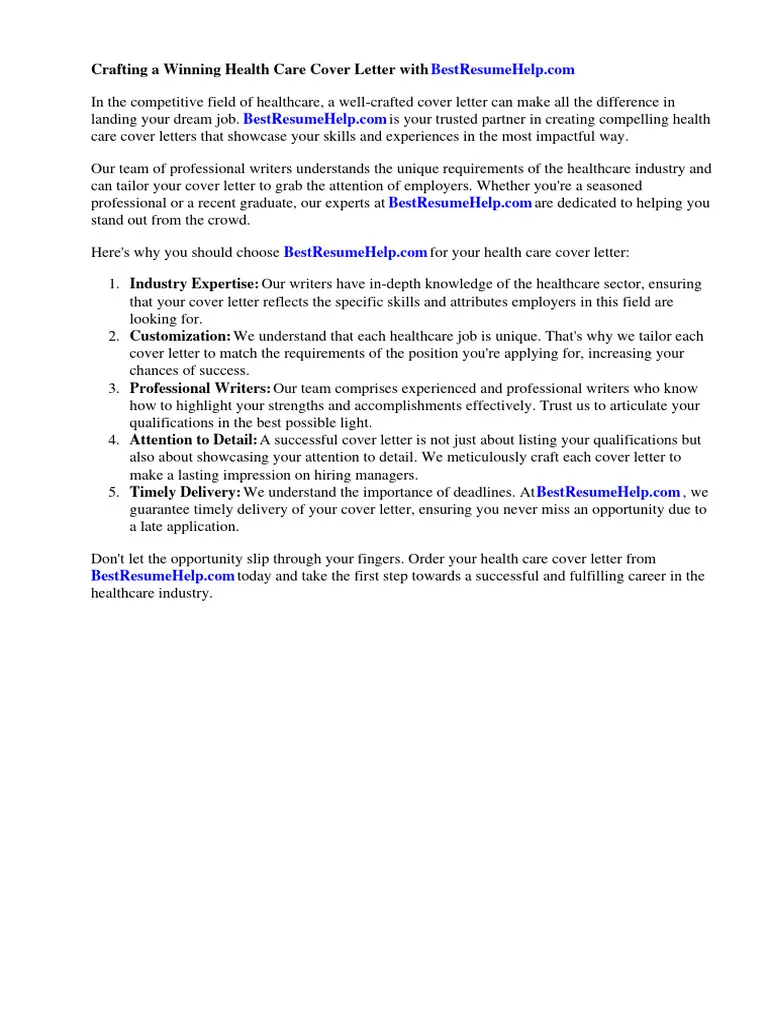Crafting an Outstanding Healthcare Cover Letter
In the competitive world of healthcare, securing your dream job requires more than just a stellar resume. A well-crafted cover letter serves as your personal introduction, providing an opportunity to showcase your personality, passion, and qualifications. It’s your chance to make a strong first impression and persuade potential employers that you are the ideal candidate. This guide offers essential strategies to help you create a cover letter that stands out from the competition and gets you noticed by hiring managers. Learn how to tailor your letter, highlight your key skills, and demonstrate your enthusiasm for the healthcare field. This detailed guide provides step-by-step instructions and helpful examples to make your cover letter shine. Remember, the cover letter is your voice in the application process. Make it count.
Understanding the Importance of a Cover Letter
A cover letter is not merely a formality; it’s a crucial component of your job application. It allows you to provide context to your resume, explaining why you’re interested in the specific position and how your skills align with the job requirements. Furthermore, it gives you the opportunity to demonstrate your writing skills, attention to detail, and professionalism. A well-written cover letter shows that you’ve taken the time to research the role and the organization, indicating your genuine interest. Neglecting to include a cover letter or submitting a generic one can be a significant misstep, as it may lead to your application being overlooked. Prioritize this document. Consider it as your opportunity to sell your story. You need to stand out. This is your ticket to getting noticed!
Why a Cover Letter is Crucial in Healthcare
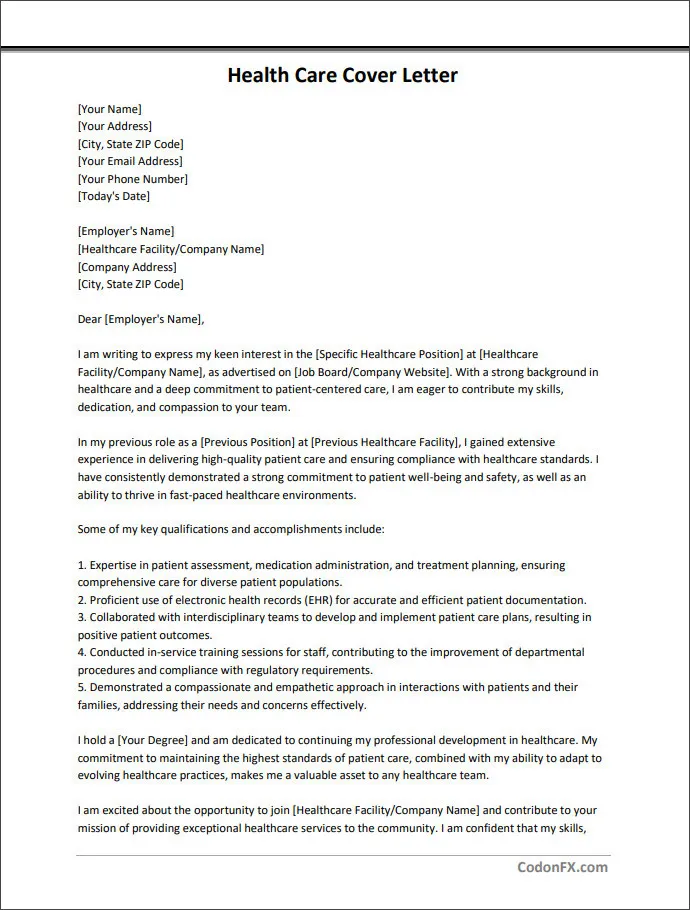
In the healthcare sector, where empathy, communication, and a patient-centered approach are paramount, a cover letter becomes even more significant. It enables you to convey your interpersonal skills and illustrate your commitment to patient care. It provides a platform to share anecdotes that highlight your experiences and accomplishments. Also, it helps to reflect your understanding of the healthcare system and the specific needs of the patients the organization serves. Healthcare employers seek candidates who are not only skilled but also compassionate and dedicated to making a difference. A compelling cover letter offers you a chance to demonstrate these qualities and set yourself apart from other applicants. The hiring team will use the letter to see who you really are.
Key Components of a Healthcare Cover Letter
A strong healthcare cover letter is comprised of several essential elements. It starts with a professional format, including your contact information, the date, and the employer’s details. The content should be organized into clear sections: a compelling introduction, a body that highlights your relevant skills and experience, and a persuasive conclusion. The tone should be professional, enthusiastic, and tailored to the specific job and organization. By adhering to these core elements, you can create a cover letter that effectively captures the attention of hiring managers. The structure is important. Be concise, clear, and make it easy for the reader to grasp your value.
Contact Information and Salutation
Begin your cover letter with your full name, address, phone number, and email address. Following this, include the date and the employer’s details: the hiring manager’s name (if available), their title, the name of the healthcare organization, and its address. The salutation should be formal and appropriate. If you know the hiring manager’s name, use “Dear Mr./Ms./Dr. [Last Name].” If you are unsure of the hiring manager’s name, use a general greeting like “Dear Hiring Manager.” Avoid overly casual greetings. Maintain a professional tone from the start. Double-check all details for accuracy, ensuring your contact information is correct and the employer’s details are up to date. A small error here can really hurt the chances of getting hired. Do not make that mistake.
Personalizing Your Letter
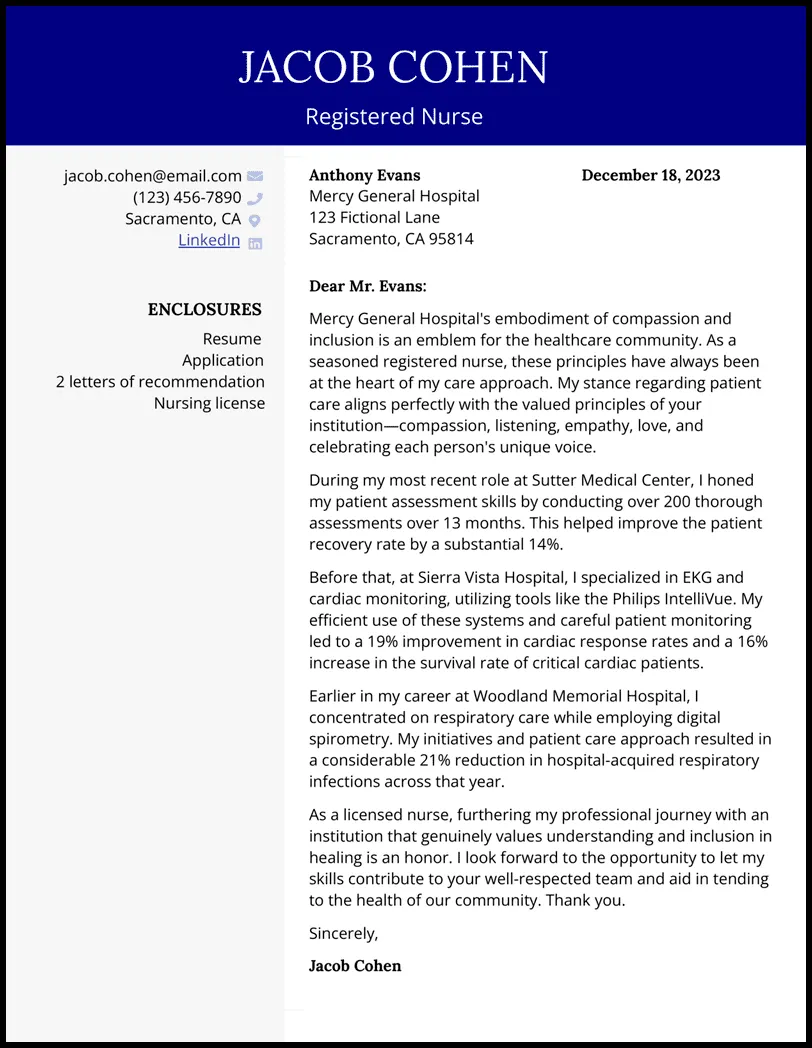
Personalize your cover letter for each job application. Research the healthcare organization and the specific role to understand their mission, values, and needs. Tailor your letter to reflect your knowledge of the organization and the requirements of the position. Show how your skills and experiences align with their goals. Avoid using generic phrases or templates. Make sure your letter addresses the specific needs and priorities of the potential employer. Adding a personal touch, such as mentioning a recent achievement of the organization or a project you admire, demonstrates your interest and attention to detail. This personalization sets you apart and demonstrates that you are genuinely interested in the opportunity and not just sending out mass applications.
Highlighting Your Skills and Experience
The body of your cover letter should spotlight your relevant skills and experience. Review the job description carefully and identify the key requirements. Then, provide specific examples that showcase how your qualifications match the employer’s needs. Focus on achievements rather than just listing job duties. Use action verbs to describe your accomplishments and quantify your results whenever possible. For example, instead of stating that you “assisted patients,” describe how you “assisted over 50 patients daily, ensuring accurate medication administration and documenting patient progress.” This approach gives the hiring manager a clear understanding of your abilities and the value you bring to the role. Tailor this section to mirror the job description, putting the most important skills upfront.
Quantifying Your Achievements
Quantifying your achievements adds credibility and impact to your cover letter. Use numbers and statistics to demonstrate the tangible results of your work. For instance, instead of writing “Improved patient satisfaction,” quantify it by saying “Improved patient satisfaction scores by 15% within six months.” Use metrics such as the number of patients served, the reduction in errors, the increase in efficiency, or the cost savings you achieved. This provides concrete evidence of your skills and expertise. Quantifiable achievements make your claims more compelling and help the hiring manager understand your potential contributions. Remember to be specific and provide context for your numbers. Numbers tell the story. Use them.
Tailoring Your Letter to the Specific Role
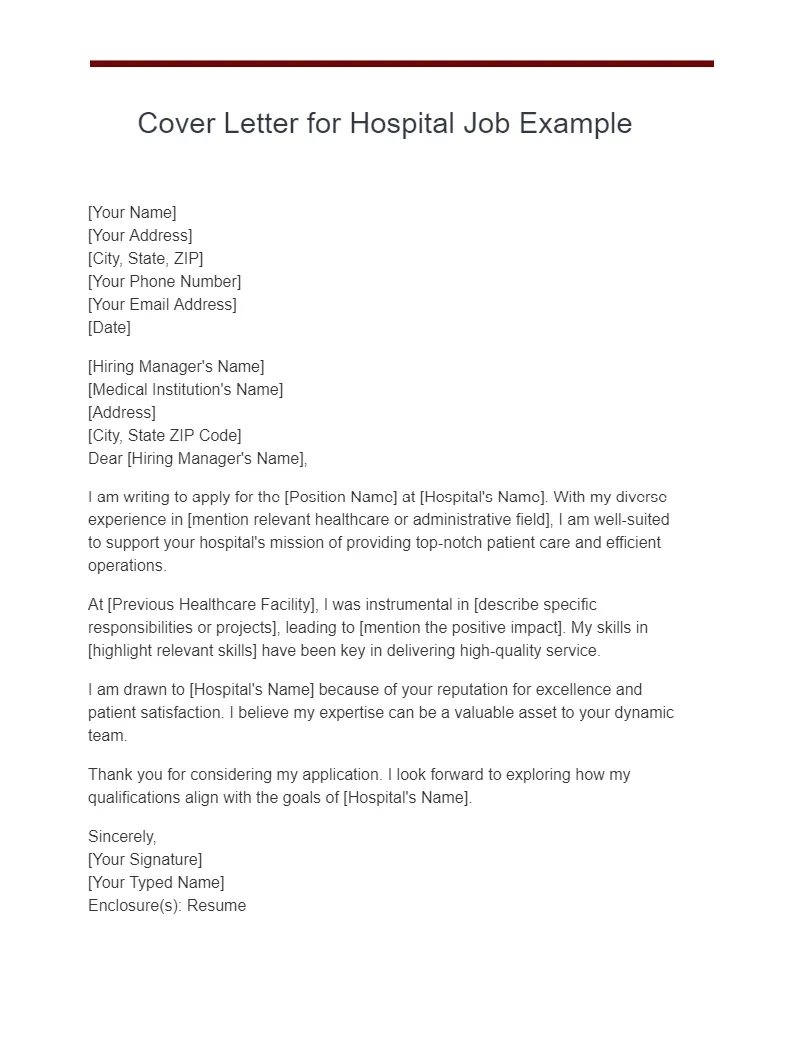
Tailor your cover letter to the specific job description and the healthcare organization. Show that you’ve researched the role and understand the requirements. Address the specific needs and priorities of the employer. Highlight how your skills and experience align with their goals. Use keywords from the job description and provide examples that demonstrate your ability to perform the required tasks. Customize your cover letter each time you apply for a new position. Generic cover letters do not make a good impression, making it obvious that you have not invested time in your application. Your tailoring demonstrates a genuine interest in the opportunity. You will certainly notice a difference.
Demonstrating Your Passion and Enthusiasm
Expressing your passion for healthcare and your enthusiasm for the specific role is a critical element of a standout cover letter. Showcase your commitment to patient care and your genuine interest in the healthcare field. Share anecdotes that demonstrate your compassion, empathy, and dedication. Highlight experiences that have shaped your passion for healthcare and your desire to make a difference. Be specific about why you are interested in the role and why you believe you are a good fit for the organization. Let your personality shine through your writing, allowing the hiring manager to see the person behind the qualifications. Enthusiasm is contagious. Make sure yours is evident.
Expressing Your Interest in the Organization
Demonstrate your genuine interest in the healthcare organization by highlighting specific aspects that appeal to you. Research the organization’s mission, values, and recent achievements. Mention any specific programs, initiatives, or patient care approaches that resonate with you. Show that you understand their goals and how you can contribute to their success. This can include a specific project, a recent award, or a community outreach program. Acknowledge what makes the organization unique. Express your desire to be part of their team. This shows that you are not just looking for a job, but that you are truly interested in the organization and its mission. It helps to indicate that you have done your homework. This is always a good look.
Showcasing Your Understanding of the Healthcare Industry
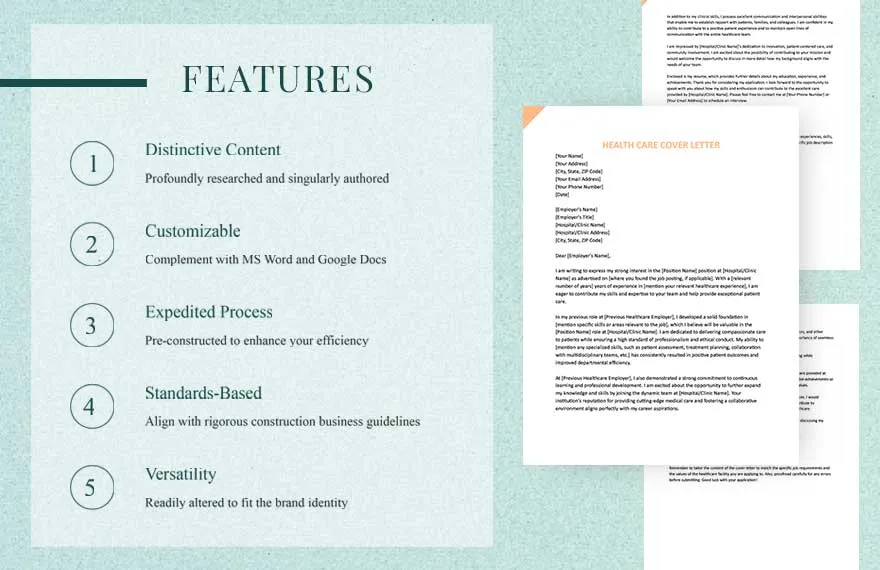
Demonstrate your understanding of the healthcare industry and the current challenges and opportunities. Discuss relevant trends, innovations, or issues. Mention any professional development activities, certifications, or publications that demonstrate your knowledge. Showcase your awareness of the importance of patient safety, quality of care, and compliance with regulations. Reflect on the healthcare industry and demonstrate your commitment to staying informed and contributing to its advancement. Understanding healthcare trends and showing your professional development shows you are well-rounded and committed to your career. It tells the employer you can make a difference.
The Importance of a Strong Closing
The closing of your cover letter is your final opportunity to leave a lasting impression. It should reiterate your interest in the position and your qualifications for the role. Express your enthusiasm and make it clear that you are eager to contribute to the organization. The closing should also include a call to action, such as requesting an interview or offering to provide additional information. Keep it concise, professional, and memorable. This is your final chance to impress, so make it count. Avoid generic phrases. End with confidence and professionalism. You want them to reach out to you.
Expressing Gratitude and Following Up
Express your gratitude to the hiring manager for considering your application. Thank them for their time and attention. Reiterate your interest in the position and reiterate your availability for an interview. Indicate how you will follow up. You can mention that you will follow up by phone or email within a week or two. Always include your contact information again in the closing. A professional closing, coupled with a clear call to action, increases your chances of getting a response. This demonstrates courtesy and professionalism. Your gratitude leaves the door open.
Proofreading and Editing Your Cover Letter
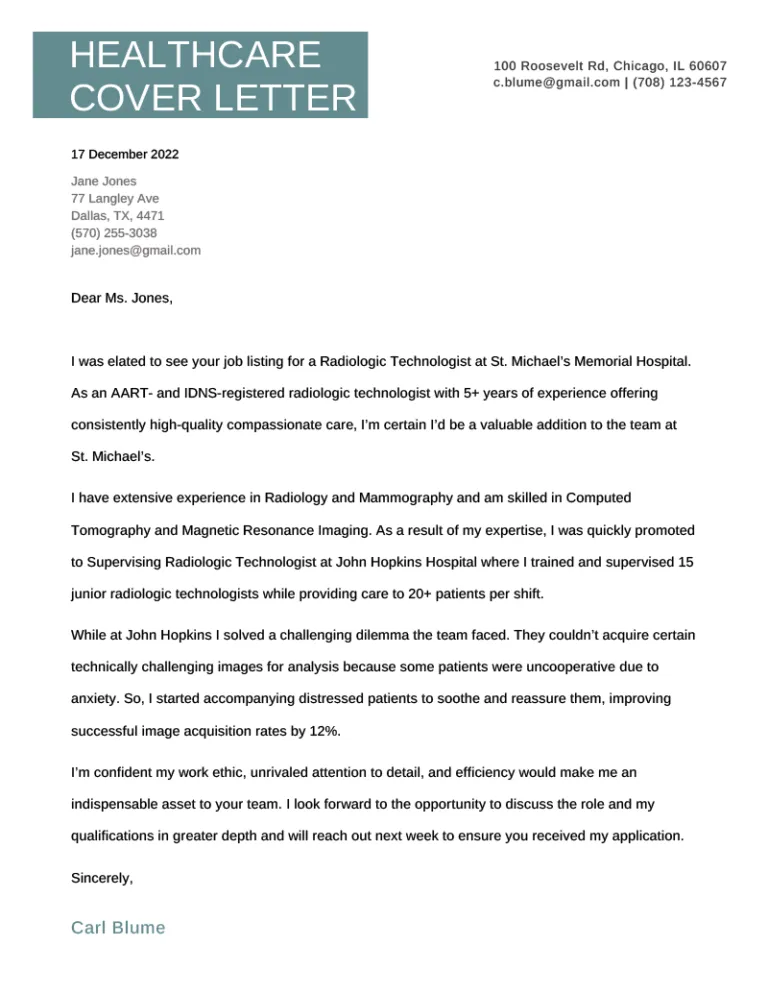
Proofreading and editing are essential steps in creating a polished and professional cover letter. Carefully review your letter for any grammatical errors, typos, or inconsistencies. Ensure that the formatting is correct, and the language is clear and concise. Consider using a grammar checker, but don’t rely on it entirely. Ask a friend, mentor, or career advisor to review your cover letter. Their fresh perspective can help you identify errors and areas for improvement. Proofreading will help you to ensure your cover letter is perfect. This is your chance to make sure everything is accurate. It is important to remember that errors can make or break your chances of success. Take your time. Be thorough.
Conclusion
By following these guidelines, you can craft a healthcare cover letter that effectively showcases your skills, experience, and passion. Remember to tailor your letter to each job, highlight your achievements, and express your enthusiasm. A well-written cover letter is your key to getting noticed by hiring managers and securing your dream healthcare job. Take the time to create a compelling cover letter. Invest in your future.
